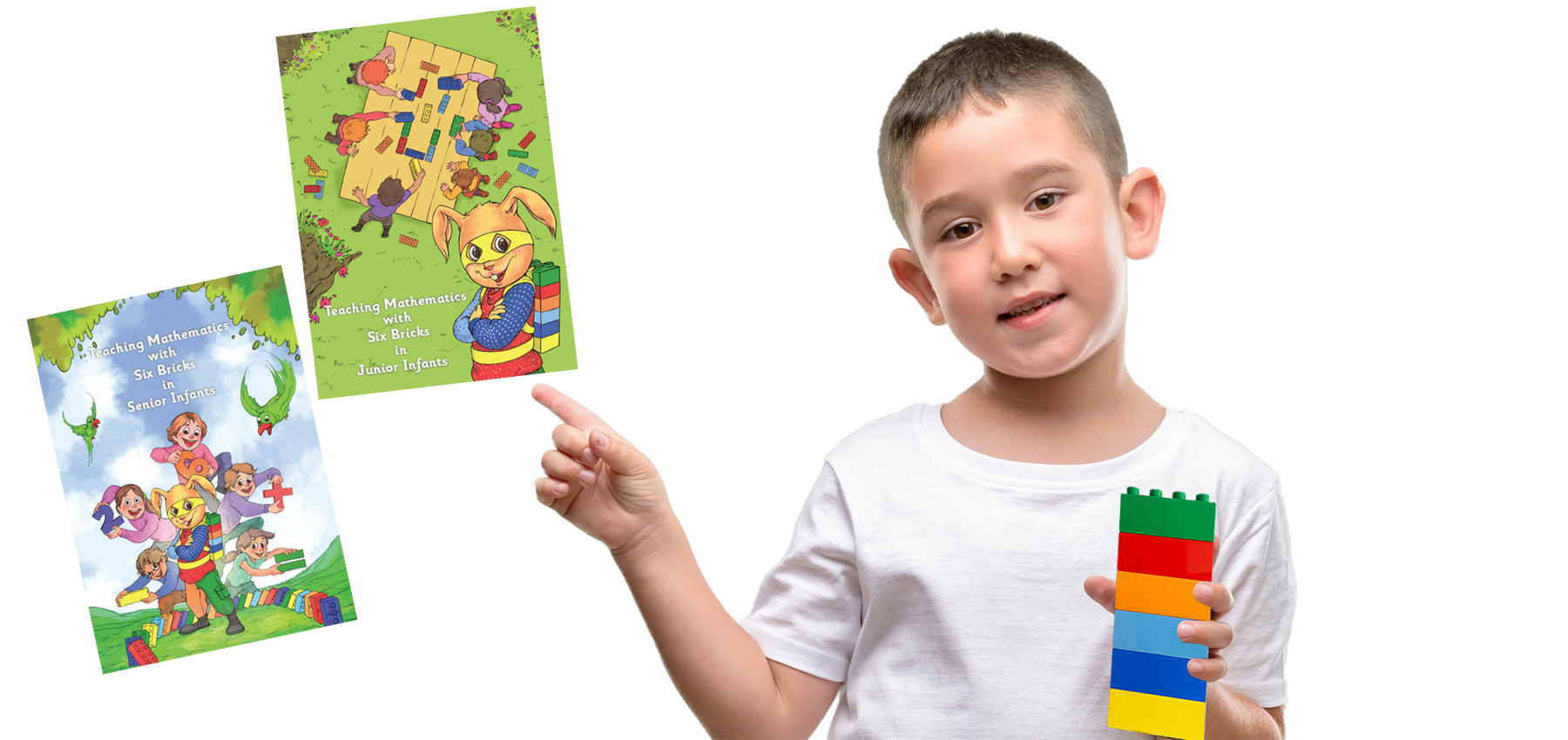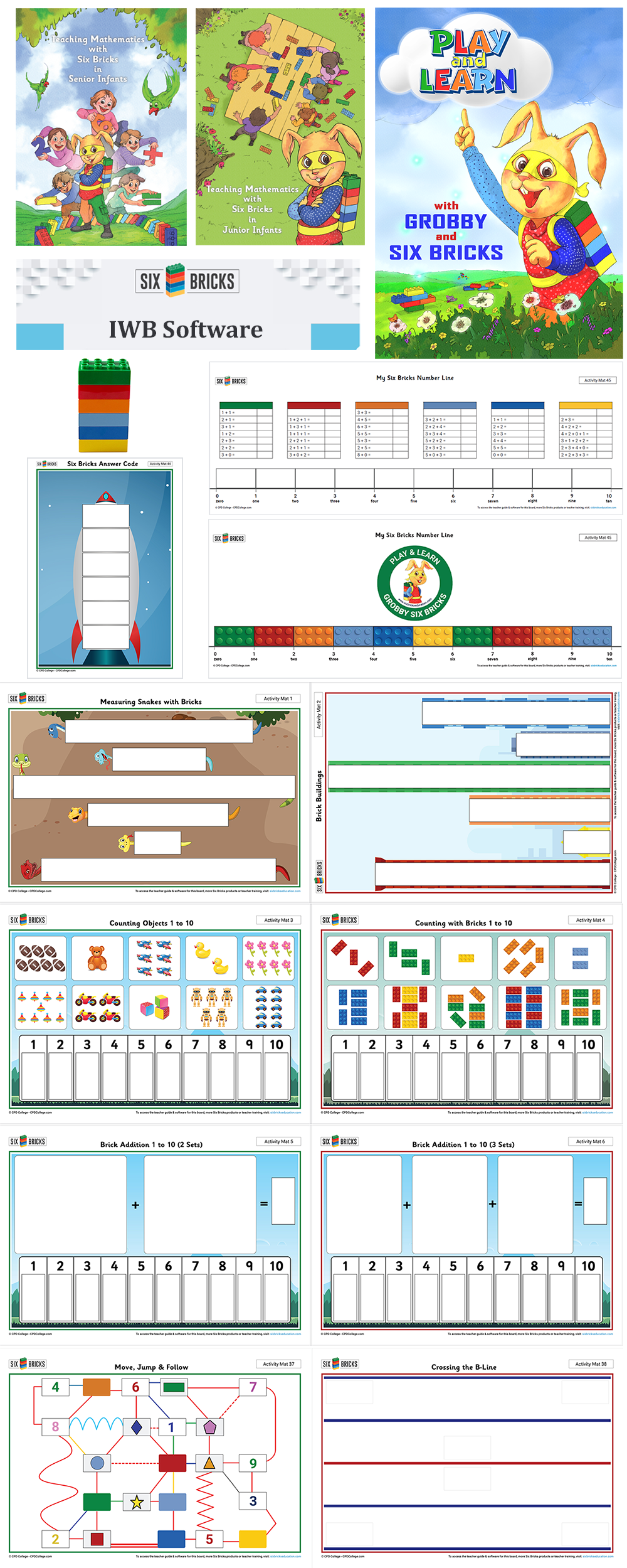
SBI - Six Bricks for Infants
An Innovative Six Bricks Approach to Infant Mathematics & the NPMC.
Grobby Six Bricks is about to revolutionise learning across the infant mathematics and the broader curriculum.
It’s Six Bricks like they have never been seen or experienced in Ireland before, and configured to deliver the learning outcomes and matching learner experiences required by the New Primary Mathematics Curriculum, and so much more.
Not only that, but imagine, all course participants will receive FREE pack, including the new two 72-page photocopiable books filled with maths lesson plans and matching task sheets. Plus, there is a FREE large A1 poster, 841mm x 594mm, for your classroom wall to denote that your classroom is embracing the Six Bricks 'Play & Learn' pedagogical approach.
Grobby Six Bricks is about to be at the heart of the infant classroom, where the bricks will facilitate, enable and drive engagement and playful learning right across mathematics and curriculum. The bricks are central to hundreds of skills-building activities, to include the following:
- Grobby teaches the New Primary Maths Curriculum - 70+ mathematics lessons for infants covering number, measures, patterns, shape & space, and data; whilst embracing mathematical modelling, maths talk, fun group work & problem-solving – aligning with the New Primary Mathematics Curriculum.
- Grobby & Perceptual Skills Development - approximately 71 activities
- Grobby & basic Numeracy Skills Development - approximately 61 more activities
- Grobby & Physical, Social-Emotional Skills Development, Groups and Games activities - approximately 77 activities
- Grobby & 'Crossing the B-Line Mat and Move, Jump & Follow Mat' - approximately 100+ activities
There is also your FREE to-use Six Bricks Interactive Whiteboard Software with detailed classroom practice guidance for each tool, which you will get to grips with in the course.
There is the Six Bricks cognition ignition question & answer rocket which will become a part of your weekly practice.
There is a template to innovate and create your own Six Bricks activities.
There is a wealth of Six Bricks tools & techniques, pedagogy & practice, and activities & actions that will deliver stand-out learning experiences for your students.
INCREDIBLE FREE RESOURCE PACK FOR ALL PARTICIPANTS (WORTH €75) - Sent by Post - See contents below

- 1 x Teaching Mathematics with Six Bricks in Junior Infants / 72 pages (34 Lessons + 34 Photocopiable task sheets)
- 1 x Teaching Mathematics with Six Bricks in Senior Infants / 72 pages (34 Lessons + 34 Photocopiable task sheets)
- 1 x Large Grobby Six Bricks Poster for your classroom wall (Size A1: 841mm x 594mm)
- 1 x Set of 6 Bricks
- 1 x Number Line A3 laminated mat
- 1 x Cognition Ignition Answer Code Rocket A4 laminated mat
- 1 x Measuring with Six Bricks A3 laminated mat
- 1 x Counting to 10 with Six Bricks A3 laminated mat
- 1 x Brick addition A3 laminated mat
- 1 x Movement A3 laminated
- FREE access to Interactive Whiteboard Software
Enrol on the Six Bricks for Infants course today to secure your place and avoid disappointment, as this course will surely be oversubscribed!
NOTE:
The online format of this course enables you to study at a time and place that best suits your needs.
You can access your course anytime until March 31st 2026.
Within this highly interactive web-based course, a dynamic learning experience awaits. You can interact with your fellow course participants through the in-course chat forums and communication tools provided by the CPD College learning system.
Our friendly and knowledgeable tutors actively support each course, providing expert interaction, guidance and feedback for all participants on chat questions and assignments which call for critical reflection, self-analysis and a reasoned response.
On successful completion of your course, you can download and print off your CPD record and certificate of completion.
We look forward to welcoming you to your course.
- Introduce the structure, components and requirements of the New Primary Maths Curriculum
- Integrate Six Bricks into the mathematical learning experiences of children
- Deploy six bricks to support mathematical modelling, maths talk and formative assessment
- Deploy a six bricks materials approach to achieving learning outcomes in all 5 strands
- Use six bricks to develop mathematical proficiency
- Motivate and sustain teaching & learning through play-based learning
- Innovate new approaches to learning maths in their classrooms
- Enhance children’s mathematical skills with brick activities
- Identify improvements in their practice by reflecting against relevant standards and statements of practice from LAOS 2022
|
01: Introduction to Six Bricks & the New Primary Maths Curriculum
|
|
02 - Six Bricks and Number (1)
|
|
03 - Six Bricks & Number (2)
|
|
04 - Six Bricks & Shape and Space
|
|
05 - Six Bricks & Measures and Data
|

Check out our dedicated Six Bricks site at https://sixbrickseducation.com/. From here you can access the Six Bricks Interactive Whiteboard Software and the Six Bricks Shop.
'The course was of a very high standard. All the video tutorials were well received and kept me interested and engaged with the content. Loads of practical tips, suggestions and mountains of activities and resources. I really like how the Six Bricks activities were mapped to the curriculum. That is definitely a feature that should be in every course. It’s so useful.' Emily, 2024
